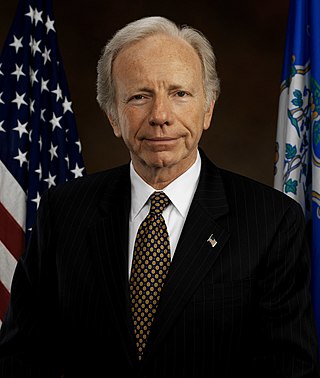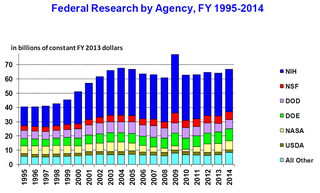Related Research Articles

Joseph Isadore Lieberman is an American politician, lobbyist, and attorney who served as a United States senator from Connecticut from 1989 to 2013. A former member of the Democratic Party, he was its nominee for Vice President of the United States in the 2000 U.S. presidential election. During his final term in office, he was officially listed as an independent Democrat and caucused with and chaired committees for the Democratic Party.

The Yucca Mountain Nuclear Waste Repository, as designated by the Nuclear Waste Policy Act amendments of 1987, is a proposed deep geological repository storage facility within Yucca Mountain for spent nuclear fuel and other high-level radioactive waste in the United States. The site is on federal land adjacent to the Nevada Test Site in Nye County, Nevada, about 80 mi (130 km) northwest of the Las Vegas Valley.

The National Technical Information Service (NTIS) is an agency within the U.S. Department of Commerce. The primary mission of NTIS is to collect and organize scientific, technical, engineering, and business information generated by U.S. government-sponsored research and development, for private industry, government, academia, and the public. The systems, equipment, financial structure, and specialized staff skills that NTIS maintains to undertake its primary mission allow it to provide assistance to other agencies requiring such specialized resources.

John Cornyn III is an American politician, attorney, and former jurist serving as the senior United States senator from Texas, a seat he has held since 2002. A member of the Republican Party, he chaired the National Republican Senatorial Committee from 2009 to 2013, and also served as the Senate majority whip for the 114th and 115th Congresses.

The 110th United States Congress was a meeting of the legislative branch of the United States federal government, between January 3, 2007, and January 3, 2009, during the last two years of the Presidency of George W. Bush. It was composed of the Senate and the House of Representatives. The apportionment of seats in the House was based on the 2000 U.S. census.
PubMed Central (PMC) is a free digital repository that archives open access full-text scholarly articles that have been published in biomedical and life sciences journals. As one of the major research databases developed by the National Center for Biotechnology Information (NCBI), PubMed Central is more than a document repository. Submissions to PMC are indexed and formatted for enhanced metadata, medical ontology, and unique identifiers which enrich the XML structured data for each article. Content within PMC can be linked to other NCBI databases and accessed via Entrez search and retrieval systems, further enhancing the public's ability to discover, read and build upon its biomedical knowledge.

Self-archiving is the act of depositing a free copy of an electronic document online in order to provide open access to it. The term usually refers to the self-archiving of peer-reviewed research journal and conference articles, as well as theses and book chapters, deposited in the author's own institutional repository or open archive for the purpose of maximizing its accessibility, usage and citation impact. The term green open access has become common in recent years, distinguishing this approach from gold open access, where the journal itself makes the articles publicly available without charge to the reader.

Joe Lieberman is an American politician, having served as a United States Senator from Connecticut from 1989 to 2013. A former member of the Democratic Party, he was the party's nominee for Vice President in the 2000 election. Currently he is an Independent.

The National Transportation Library (NTL) maintains and facilitates access to information necessary for transportation decision-making in government and coordinates with public and private transportation libraries and information providers to improve information sharing among the transportation community. It is currently under the administration of the Bureau of Transportation Statistics (BTS).
An open-access mandate is a policy adopted by a research institution, research funder, or government which requires or recommends researchers—usually university faculty or research staff and/or research grant recipients—to make their published, peer-reviewed journal articles and conference papers open access (1) by self-archiving their final, peer-reviewed drafts in a freely accessible institutional repository or disciplinary repository or (2) by publishing them in an open-access journal or both.

The science policy of the United States is the responsibility of many organizations throughout the federal government. Much of the large-scale policy is made through the legislative budget process of enacting the yearly federal budget, although there are other legislative issues that directly involve science, such as energy policy, climate change, and stem cell research. Further decisions are made by the various federal agencies which spend the funds allocated by Congress, either on in-house research or by granting funds to outside organizations and researchers.
The Fair Copyright in Research Works Act was submitted as a direct response to the National Institutes of Health (NIH) Public Access Policy; intending to reverse it.

The Research Works Act, 102 H.R. 3699, was a bill that was introduced in the United States House of Representatives at the 112th United States Congress on December 16, 2011, by Representative Darrell Issa (R-CA) and co-sponsored by Carolyn B. Maloney (D-NY). The bill contained provisions to prohibit open-access mandates for federally funded research and effectively revert the United States' National Institutes of Health Public Access Policy, which requires taxpayer-funded research to be freely accessible online. If enacted, it would have also severely restricted the sharing of scientific data. The bill was referred to the House Committee on Oversight and Government Reform, of which Issa is the chair. Similar bills were introduced in 2008 and 2009 but have not been enacted since.

Access2Research is a campaign in the United States for academic journal publishing reform led by open access advocates Michael W. Carroll, Heather Joseph, Mike Rossner, and John Wilbanks.

The Fair Access to Science and Technology Research Act (FASTR) is a bill in the United States that would mandate earlier public release of taxpayer-funded research. The bill has been introduced in 2013, 2015, and 2017. Sen. Ron Wyden (D-Ore.) and Sen. John Cornyn (R-Texas) introduced the Senate version, while the bill was introduced to the House by Reps. Zoe Lofgren (D-Calif.), Mike Doyle (D-Penn.) and Kevin Yoder (R-Kans.). The bill is a successor to the Federal Research Public Access Act (FRPAA), which had been introduced in 2006, 2010, and 2012.
The NIH Public Access Policy is an open access mandate, drafted in 2004 and mandated in 2008, requiring that research papers describing research funded by the National Institutes of Health must be available to the public free through PubMed Central within 12 months of publication. PubMed Central is the self-archiving repository in which authors or their publishers deposit their publications. Copyright is retained by the usual holders, but authors may submit papers with one of the Creative Commons licenses.

The Human Trafficking Prevention Act is a bill that would require regular training and briefings for some federal government personnel to raise awareness of human trafficking and help employees spot cases of it.
The Email Privacy Act is a bill introduced in the United States Congress. The bipartisan proposed federal law was sponsored by Representative Kevin Yoder, a Republican from Kansas, and then-Representative Jared Polis, a Democrat of Colorado. The law is designed to update and reform existing online communications law, specifically the Electronic Communications Privacy Act (ECPA) of 1986.

The idea and practise of providing free online access to journal articles began at least a decade before the term "open access" was formally coined. Computer scientists had been self-archiving in anonymous ftp archives since the 1970s and physicists had been self-archiving in arXiv since the 1990s. The Subversive Proposal to generalize the practice was posted in 1994.

Amy Jean Klobuchar is an American lawyer and politician serving as the senior United States senator from Minnesota. A member of the Minnesota Democratic-Farmer-Labor Party, Minnesota's affiliate of the Democratic Party, she previously served as the Hennepin County Attorney. She ran for the Democratic nomination for President of the United States in the 2020 election, before pulling out in March and endorsing Joe Biden.
References
- ↑ "Federal Research Public Access Act 2006". Archived from the original on 2012-01-11. Retrieved 2011-10-24.
- ↑ Kaiser, Jocelyn (10 February 2012). "Lawmakers Reintroduce Public Access Bill". ScienceInsider. American Association for the Advancement of Science. Retrieved 10 February 2012.
- ↑ "S.1701 - Fair Access to Science and Technology Research Act of 2017". congress.gov. Retrieved June 10, 2023.
- ↑ "Bill Text - 111th Congress - S. 1373 - Federal Research Public Access Act of 2009" (PDF).[ permanent dead link ]
- ↑ "FRPAA FAQ" (PDF). Archived from the original (PDF) on 2012-01-11. Retrieved 2011-10-24.
- ↑ "H.R. 5037".
- ↑ "Higher Ed Leaders Support Public Access, 2009-2010". Archived from the original on 2011-10-12. Retrieved 2011-10-24.
- ↑ "52 Nobel laureates endorse FRPAA". Archived from the original on 2012-05-02. Retrieved 2012-05-12.
- ↑ "The Association of American Publishers". publishers.org. 5 March 2012. Archived from the original on 8 March 2012. Retrieved 8 March 2012.